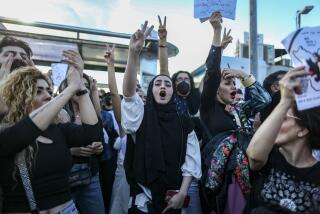Yemen’s president hints he might step down
Reporting from Cairo — Pro- and antigovernment demonstrators swept through the Yemeni capital, Sana, on Friday as President Ali Abdullah Saleh said he may conditionally step aside and hand the nation to “safe hands” to avert further bloodshed after weeks of protests.
The timing of a possible resignation was unclear, but Saleh’s conciliatory comments were an indication that the embattled president was seeking a graceful exit after the defections of key tribal leaders and his top generals.
Saleh is known for his political cunning, however, and it was uncertain whether he was merely maneuvering or was actually planning to step down.
“We don’t need power. We need to hand it over to safe hands, and not to corrupt and hateful hands,” Saleh said in a speech to thousands of supporters near an opulent mosque in Sana that bears his name. “We are against firing a single bullet, and when we give concessions, this is to ensure there is no bloodshed. We will remain steadfast.”
Sana remained a tense and divided capital. Tens of thousands of Saleh supporters marched under the banner “Friday of tolerance” while just as many antigovernment protesters rallied for a “Day of Departure.” Even the Yemen army has been split, its loyalties divided between the two camps.
The potential for violence was high, but the mood shifted to quiet anticipation that a deal to end Saleh’s 32-year rule was in the making. The president has resisted such a scenario, but the political momentum shifted dramatically against him this week when he was abandoned by several powerful tribal sheiks, and his military’s top commander, Maj. Gen. Ali Mohsin Saleh Ahmar, along with four other generals, joined opposition protesters.
Saleh and Ahmar have held at least one round of talks in recent days, and Saudi Arabia is attempting to mediate a settlement between the president and opposition leaders. Saleh had indicated that he would leave office by year’s end, but his comments Friday suggested that he would go sooner if power were handed to one of his allies.
But there are many unresolved questions: Would the president depart the country with his family — his son and nephews hold military and intelligence posts — and members of his corrupt inner circle? What role, if any, would Ahmar, who allegedly has ties to radical Islam and was once close to Saleh, play in a new government?
The sticking point of any discussions “is the subject of his departure,” said Sakhr Wajih, an independent member of the parliament and former member of the committee for national dialogue. “It still seems, though, that the president is unwilling to seriously deal with the demands of the protesters themselves and persists in trying to draw the official opposition into a cynical deal.”
The president would like to “leave peacefully, and not be seen to be forced out,” said Sami Ghaleb, editor of the independent Nida newspaper. “By rallying his partisans today, probably to a large extent with cash inducements, he is trying to show that he is genuinely loved, and thus preserve his reputation in the event of major concessions.”
U.S. and Middle East officials have been closely following Saleh’s predicament, fearing that further turmoil would aggravate an impoverished nation facing an intermittent rebel war in the north, a secessionist movement in the south and an active Al Qaeda affiliate. Saleh has held such a tight grip on power that there is no obvious replacement.
The demonstrations Friday showed that both Saleh and the opposition could mobilize the masses. A convoy of Toyota Land Cruisers, emblazoned with images of the president, blared patriotic anthems from loudspeakers and honked in unison as a Soviet-era government helicopter swept over the crowd, drawing cheers and victory signs.
Khaled Jabri, a businessman from the southern port of Mukalla, sporting the traditional checkered sarong-like futah of his region, exclaimed: “All of us are here, the sons and daughters of every province of the republic. We are here to honor the president, and out of respect for any initiative he takes for the sake of the nation.”
The long thoroughfare separating Saleh’s mosque from Sana University, the epicenter for antigovernment protests, was scattered with security forces, as hundreds of riot police huddled around fortified vans, their water cannons ready.
But the positions of Ahmar’s 1st Armored Division crept outward from Sana University in what appeared to be a tactic to protect anti-Saleh demonstrators. One week ago, more than 50 protesters were shot by pro-government forces.
Children with Yemeni flags painted on their cheeks clutched heart-shaped balloons and casually strolled with their families, while hundreds of tribesmen ate lunch and huddled around makeshift cinemas for news of any political developments.
“We’ve won, we can feel it,” said 21-year-old student Sharaf Qadimi. “There have been enough martyrs already; we don’t need to risk our lives in a march to the palace to force President Saleh to leave. He already knows he’s finished.”
A special correspondent in Sana, Yemen, contributed to this report.
More to Read
Sign up for Essential California
The most important California stories and recommendations in your inbox every morning.
You may occasionally receive promotional content from the Los Angeles Times.











